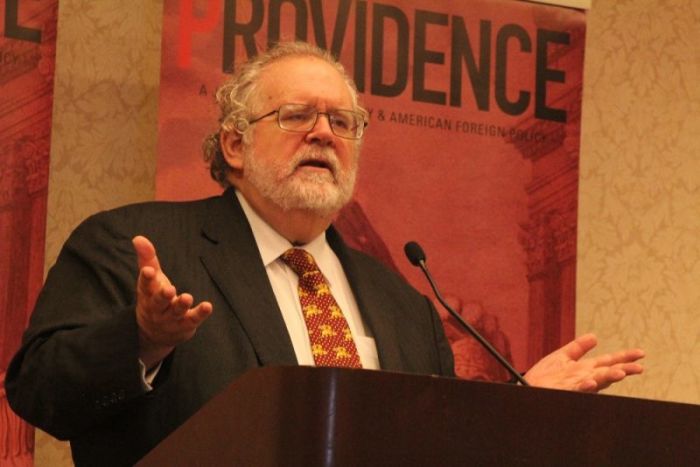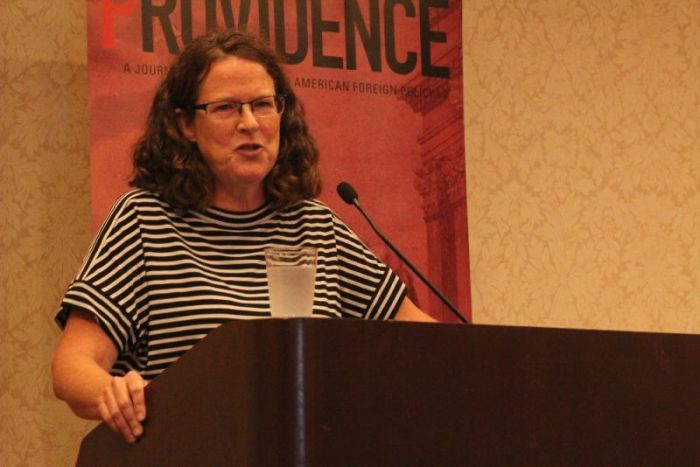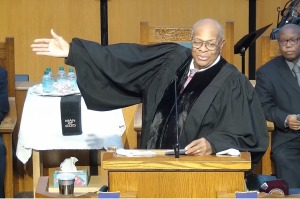Arrogantly Invoking God in Foreign Policy Debates Is Blasphemous, Christian Historian Warns

WASHINGTON — International affairs expert and author Walter Russell Mead warned Friday that its blasphemous for Christian leaders to arrogantly invoke God in order to promote ideologies of pacifism and non-engagement in foreign relations debates.
Mead, a professor of foreign affairs and humanities at Bard College who formerly served on the Council on Foreign Relations, was the first speaker to offer his thoughts at the second annual Christianity & National Security conference hosted by Providence: A Journal of Christianity & American Foreign Policy at the Georgetown University Hotel and Conference Center.
With the two-day conference addressing topics like Just War and reflecting on the "essential historic Christian teaching about God's purpose for government," the 66-year-old Mead spoke on the topic of "Christian realism."
Mead, who is also the editor-at-large of The American Interest magazine and senior fellow at the Hudson Institute think tank, explained that Christianity offers "the soundest possible basis intellectually, psychologically and spiritually for the kind of realism that undergoes smart foreign policy."
He added that the faith offers the "best diagnosis for what is wrong with us as people" and "the only real cure for the ailments of the human race."
However, he warned that Christians need to maintain a level of "sobriety" in international relations and not get too carried away with ideas of utopianism, catastrophism or denialism.
"I do think that the field of foreign affairs needs more Christians in it," Mead, a Wall Street Journal columnist, explained. "And, the Christians who are active in this field need more wisdom and need better access to some of the riches in the Christian faith, which is a need they share in common with non-Christians. As we look at our time and the challenges that we are facing now, there is a greater need for a more conscious engagement in Christianity and Christian faith than ever before, not that there hasn't always been a great need."
Mead said that for many, it is very hard to "be sober" about the realities of the world.
He added that people must truly understand how dangerous the world is, how limited the resources are and how immense the world's problems are before they can come to a logical decision on foreign policy matters.
He warned that there are three enemies to sobriety in foreign policy debates that prevent solid action on an international stage, and also influence how Christians act on a certain issue: utopianism, catastrophism and denialism.
"They blind us to the essential features of the world that we live in and make it harder for us to act effectively," he stressed. "These are not trivial problems, they are deadly. By deadly, I mean that they kill people."
Mead stressed that some people fall into the trap of utopianism, or the idea that a certain political agenda or set of ideas will lead to the desired outcome. Meanwhile, he said, others fall into the trap of catastrophism, where certain things (like abolishing nuclear weapons or limiting fossil fuels) must happen or else the world is going to end.
Mead said that "utopia builders" actually kill people when they go into other countries thinking they can create a better reality for that particular nation. He pointed to the U.S. intervention in Libya in 2011 that resulted in the overthrowing of the Muammar Gaddafi government.
"The Libyan intervention was hailed as the fantastic example of at long last, the truly moral people were able to shape a policy and we were going to go in there and stop the murder from Gaddafi," Mead said. "It may well have stopped a murder but one looks at Libya ever since and one sees a long series of murders and massacres."
As for catastrophism, Mead accused proponents of global warming reforms of deliberately trying to "steer people in a way to stampede them to take action."
"It is not wrong to worry about climate change or nuclear proliferation. It's not wrong to worry about some of the trends we are seeing conflict between great powers around the world. There is nothing wrong about perceiving that the human race is playing for great stakes because we are," Mead assured. "But what happens far too frequently is that we become so fascinated and dazzled by the glorious prospects opening before us or so horrified and terrified of the abyss that lies before us — world peace, nuclear war — we lose the capacity for real thought and action."
Mead warned that denialism is the belief that catastrophists and utopianists are "hot-headed" and that there aren't any dangers or "anything to worry about." Mead added denialism is when people want to "continue marching down [a certain] path regardless of all the things that would try to startle us out of that belief."
Mead criticized the civil society movements during the 1930s that centered around pacifism and the "the feckless idealism of the American Christianity in the 1930s."
"You see people so terrified of what another war would be like that they sort of leap into this kind of pacifism," Mead said, adding that many formed pacifist associations calling for unilaterally disarming. "A lot of good people put a lot of energy into these movements in the 1930s with no real self awareness that every piece of work they did and every meeting they held and every member of Congress that they lobbied, they were helping [Adolf] Hitler and [Joseph] Stalin prepare the way for mass murder."
"They weren't helping the world, they were hurting the world. Before the judgement seat of God, they will render an account," Mead added. "They weren't bad people. But, in this world, being stupid can be worse in some ways than having an overly bad intention."
Mead contended that we are seeing a lot of this type of behavior today. He argued that "the most depressing site perhaps in the world is a group of religious dignitaries signing a petition about something that they don't really know very much about."
"We the undersigned clergy and laity are really against X and for Y," Mead said. "Well that is very nice, but do they actually know any more about X or Y than all the people who are not signing the petitions or who are actually in the bowels of the State Department or wherever it is they are working on the issue? Sometimes they do. But much more often, they don't."
Mead said that these religious leaders "mistake arrogance and egotism for concern."
"[They] don't fully understand just how blasphemous this is — invoking the authority and prestige of God in order to make your stupid ideas seem more impressive," Mead said. "I'm quite serious. This is blasphemy. This is one of the reasons I am afraid that so many of our politicians and civil servants and others have such contempt for the Christian faith."
Mead contested that government officials and lawmakers have learned to view idealistic Christians as "idiotic, bubble-headed, well-intentioned people who are enormously ignorant and enormously arrogant at the same time but think they are humble and wise."
"In your heart, you will never have any of these people in a room where serious decisions are being made because they only muck it up," Mead asserted. "Marx may or may not be right about religion generally but here religion is opiate. It is producing an illusory feeling of success and illusory feeling of mastery. People are using it to lubricate their egos. We don't realize how much damage is done to Christianity because of this behavior."
Mead advised that in order to pursue effective foreign policy, there needs to be a "freedom from idolatry."
"What I mean by idolatry is the belief that something made with human hands can offer an absolute path of safety and security," he stated. "The social justice agenda, the Libertarian agenda, these ideologies that there is some sort of path that if we just follow step-by-step along that path we will be safe and delivered. That doesn't mean that there aren't useful suggestions in these or ignore all of these ideas and all of these problems, but it does mean that none of them are going to get us out of the woods."
Mead said that good things become "products of evil" when they are worshipped as Gods.
"The worship of justice leads to cruelty and intolerance. The worship of peace leads to cowards and acquiescence and injustice. The worship of freedom leads to anarchy," he explained. "The worship of prosperity destroys the foundations of society and hollows out the human family and heart and inaugurates the reign of greed. As idolaters, we can neither think clearly about the world nor act wisely in it. We must know God in order to love and serve in truth."
Speaking later in the day on Friday was Mary Habeck, an adjunct professor at Johns Hopkins School of Advanced & International Studies who served an appointment with the National Security Council.

As there has been much debate around the decisions of the U.S. government to pull out of Iraq and Afghanistan and not to engage in the Syrian civil conflict over the last decade, Haybeck warned that "violence got far, far worse when the U.S. did not engage than when the U.S. did engage."
"More people have been killed in Syria than were killed in Iraq during the American engagement there. More people have been radicalized in Syria than were radicalized by the Iraq War by a huge percentage, magnitudes," she said. "When we chose not to engage, a lot of bad actors chose to engage. By withdrawing, we actually empowered Russia to fix to the problem. We actually empowered Iran to fix the problem themselves when we chose not to engage."
"Not doing things sounds like the safe bet," she added. "But in this specific example from 2011 through the present, we can see that our choice not to engage and not to project power led to far more deaths and destruction and the empowerment of far more bad people than our decision to engage in the Iraq War."
Haybeck did inform the audience that the tendency toward international engagement also has its "false gods and temptations."
"Temptations and false god of pride that we can fix this, that we know best, that we can do it all ourselves and we don't need to have other people tell us how do it," Haybeck explained. "Pride as we all know is the heart of the fall and original sin. Rejection of pride is just as important if we are going to understand how we should be interacting with the world."





























